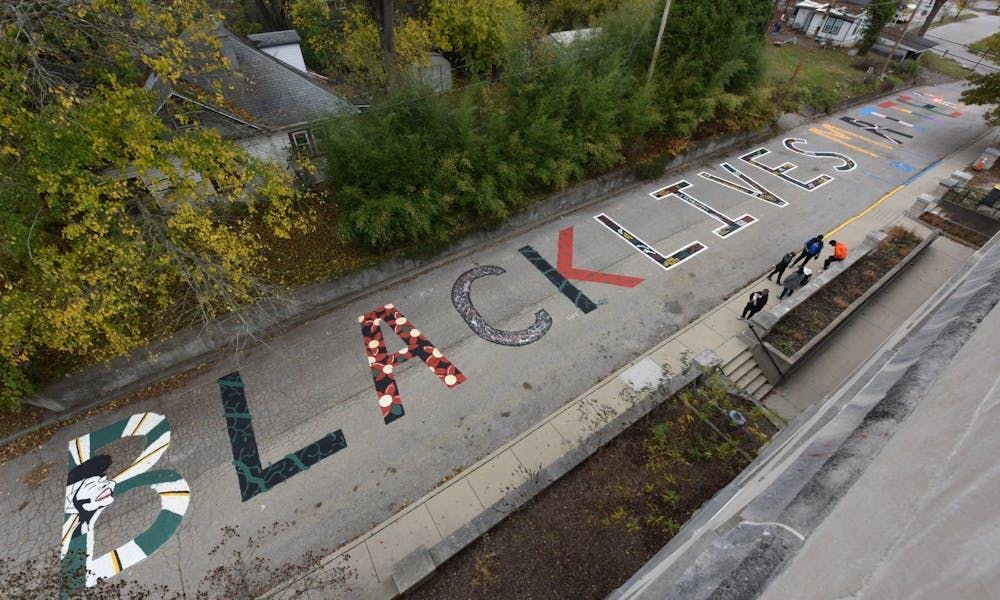Editor's note: All opinions, columns and letters reflect the views of the individual writer and not necessarily those of the IDS or its staffers.
In the months following the murder of George Floyd in 2020, America made a promise. From gyms to gas stations to grocery stores, everywhere you looked or shopped echoed the promise: “We will do better.” Protests were marched, murals were painted and Donald Trump was defeated in the polls. It seemed that finally, we might be on a path towards a better future.
In August of the same year, then-CEO of Duke Energy Lynn Good joined the chorus of corporate promises, saying, "our company and, indeed, the nation have been challenged by the killing of George Floyd and its aftermath. Issues surrounding racial equity and social justice are front and center as they should be. A national movement has been ignited that demands much more than its debate, it deserves action."
However, in recent months, Duke has backtracked from this stance, removing commitments to diversity, equity, and inclusion from their SEC filings and other corporate communications and documents. The sixth-largest private utility in the world dropped HBCU partnerships and diversity targets from its reports. Clearly, they weren't feeling “challenged” for very long.
Duke isn't the only culprit here; since the 2024 presidential election, a slew of other influential corporations, including Amazon, Meta, Google, Target, Ford and Walmart have come down with a severe case of Trump-appeasement fever and backpedaled on DEI promises, all despite having made strong racial justice pledges in 2020.
The message from these corporations is clear: Black Lives Matter, but only as marketing.
How many more innocent people will have to die and posthumously become martyrs for a well-intentioned movement of Instagram infographics and empty corporate promises before the United States decide it’s time for real change?
With Pride Month coming up in June, many cities are finding that their long-time corporate sponsors — many of whom once proudly displayed rainbow logos and released Pride collections — are folding this summer. Eve Keller, co-president of USA Prides, a national network of LGBTQ Pride organizers, said that Pride organizers across the country have reported receiving “significantly less in sponsorship dollars this year.” Keller said some of the smaller, rural Prides are down “70% to 90% when compared to the average year.”
According to a Pew Research Center survey, 56% of employed U.S. adults, focusing on increasing DEI at work is a good thing. But meaningful change takes time. It takes consistent effort, deep reflection, and a willingness to confront uncomfortable truths. Reversing decades — if not centuries — of systemic discrimination in the workplace isn’t something that can be solved with a one-time training or a temporary initiative. It requires long-term commitment, accountability at every level, and policies that are actually designed to uplift and include — not just to check boxes. When corporations quietly walk back their promises, they aren’t just abandoning a program; they’re abandoning people. Dismantling these programs to appease political pressure isn’t just ethically questionable; it’s bad business.
The reality is, a diverse America exists whether our government or corporations want to accept it or not. Human rights don’t change based on what is perceived as popular or not and neither should our commitment. Making sure the voices of individuals from historically marginalized communities are heard is a promise that should be taken seriously, something that should facilitate lasting change in an organization and should be seen on all levels. The mass corporate backsliding of DEI policies we are witnessing now reveals what these policies were all along: performative virtue signaling that was never actually intended to help anyone.
So, what can you do? As it turns out, quite a bit. Start by doing your research and voting with your dollar. Quit supporting companies that wouldn’t support you. Civil rights activist Reverend Al Sharpton recently led a "buy-cott" at a Costco in East Harlem, New York, with more than 100 members of his nonprofit, National Action Network, to support the company's commitment to DEI. We make decisions every day, from where we do our grocery shopping to where we choose to work. These decisions have power, so use that power to make a difference. No action is too small.
Real change doesn’t come from slogans or rainbow-colored logos, it comes from action. If corporations won’t uphold their promises, it’s up to us to hold them accountable. Spend intentionally, speak up, and support the communities that need it most.
Ainsley Foster (she/her) is a junior studying Elementary Education.






